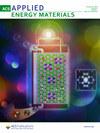CeOx-Mesoporous Silica Nanoparticle Antioxidants to Enhance the Stability of Organic Photovoltaic Devices
IF 5.4
3区 材料科学
Q2 CHEMISTRY, PHYSICAL
引用次数: 0
Abstract
Mitigating ultraviolet exposure-induced photodegradation remains a critical challenge to the long-term stability of organic photovoltaics (OPVs). Here, we improved the stability of the OPV device by introducing an antioxidant interlayer composed of nanocrystalline ceria supported on mesoporous silica nanoparticles (CeOx-MSN). The CeOx nanocrystals within the CeOx-MSN exhibited a high density of oxygen vacancies and a large ratio of Ce(III) chemical states known to scavenge reactive oxygen species. Optimizing the particle size of the CeOx nanocrystals further enhanced the ratio of Ce(III) states, enabling superior radical scavenging efficacy in methyl violet degradation tests compared with commercial CeOx nanostructures. The OPV performance test confirmed that the optimized CeOx-MSN (CeOx-MSN_S) can scavenge radicals without a degradation in initial performance under one-sun illumination. More importantly, the photostability test revealed that the OPV device with CeOx-MSN_S retained 73% of initial performance while the conventional device retained only 54%, corroborating the excellent radical scavenging efficacy of CeOx-MSN_S.CeOx-Mesoporous Silica 纳米粒子抗氧化剂提高有机光伏器件的稳定性
减轻紫外线照射引起的光降解仍然是有机光伏器件(OPV)长期稳定性面临的一项严峻挑战。在这里,我们通过引入由介孔二氧化硅纳米颗粒(CeOx-MSN)支撑的纳米铈晶体组成的抗氧化夹层,提高了 OPV 器件的稳定性。CeOx-MSN中的CeOx纳米晶体显示出高密度的氧空位和大比例的Ce(III)化学态,而众所周知,Ce(III)化学态能清除活性氧。通过优化 CeOx 纳米晶体的粒度,进一步提高了 Ce(III)化学态的比例,使其在甲基紫降解测试中的自由基清除功效优于商用 CeOx 纳米结构。OPV 性能测试证实,优化后的 CeOx-MSN (CeOx-MSN_S)可以清除自由基,在一太阳光照射下的初始性能不会下降。更重要的是,光稳定性测试表明,含有 CeOx-MSN_S 的 OPV 器件保留了 73% 的初始性能,而传统器件仅保留了 54%,这证实了 CeOx-MSN_S 极佳的自由基清除功效。
本文章由计算机程序翻译,如有差异,请以英文原文为准。
求助全文
约1分钟内获得全文
求助全文
来源期刊

ACS Applied Energy Materials
Materials Science-Materials Chemistry
CiteScore
10.30
自引率
6.20%
发文量
1368
期刊介绍:
ACS Applied Energy Materials is an interdisciplinary journal publishing original research covering all aspects of materials, engineering, chemistry, physics and biology relevant to energy conversion and storage. The journal is devoted to reports of new and original experimental and theoretical research of an applied nature that integrate knowledge in the areas of materials, engineering, physics, bioscience, and chemistry into important energy applications.
 求助内容:
求助内容: 应助结果提醒方式:
应助结果提醒方式:


